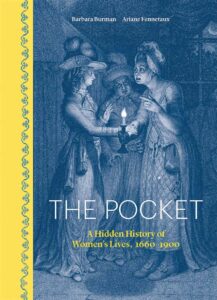
The Pocket
A Hidden History of Women’s Lives, 1660–1900
Publication | Table des matières | Critiques
Résumé
Alors que les hommes ont des poches intégrées à leur vêtement depuis au moins le 16e siècle, les femmes ont elles des poches indépendantes de leur vêtement qui se nouent autour de la taille sous la jupe. Extrêmement grandes, ces poches détachables leur permettent de transporter avec elles argent, clés, nourriture, portraits miniatures ou correspondances secrètes tout autant que tabatières, microscopes portatifs ou même dans un cas des canards volés à un fermier… Au croisement de l’histoire matérielle et de l’histoire du genre, l’histoire des poches nous offre une manière originale d’interroger l’histoire sociale et culturelle mais aussi économique ou politique des femmes aux 18e et 19e siècles.
S’appuyant sur des sources aussi diverses que compte-rendus de procès, lettres, journaux privés, livres de compte, inventaires ou sources commerciales mais aussi près de 400 spécimens de poches conservées dans plus de 30 collections britanniques, les auteures dévoilent le surprenant contenu des poches ainsi que la manière dont elles révèlent les consommations textiles des femmes, leurs relation au travail, à la mobilité, ou à l’intimité.
L’ouvrage met en avant une approche novatrice qui s’appuie sur les objets comme source de son enquête au même titre que les sources plus traditionnelles de l’histoire sociale et culturelle pour révéler l’histoire de ces objets à la fois inattendus et évocateurs.
Table des matières
Critiques
- The Pocket, A Hidden History of Women’s Lives 1660-1900 – Ariane Fennetaux on Newstalk (6’42) : https://www.newstalk.com/podcasts/highlights-from-moncrieff/pocket-hidden-history-womens-lives-1660-1900
- “What particularly interests Burman and Fennetaux is the way in which women of all classes have historically used these tie-on pockets as a supplementary body part to help them negotiate their way through a world that was not built to suit them” —Kathryn Hughes, Guardian
- “Barbara Burman and Ariane Fennetaux demonstrate the riches to be found in a unique gendered accessory – the tie-on pocket. They illuminate centuries of British women’s history through their deep knowledge of material culture, showcasing women’s priorities and embodied experiences. Omnipresent, though often hidden, pockets evoked fashion and female virtues. Recovered histories of pockets, their embellishment and persistent usage, reveal vital features of women’s lives”– Professor Beverly Lemire, Henry Marshall Tory Chair at the University of Alberta
- Podcast ABC – Blueprint for living – The pocket: a hidden history of women’s lives – 1 Feb 2020
A story of the pocket that reveals a history of gender, of patriarchal repression and of women’s resistance.
Ariane Fennetaux, Associate Professor, Laboratoire de Recherche sur les Cultures Anglophones and co-author of The Pocket: A Hidden History of Women’s Lives, 1660-1900
https://www.abc.net.au/radionational/programs/blueprintforliving/the-pocket:-a-hidden-history-of-womens-lives/11912788 - “This important volume from an authoritative international team of authors sheds significant new light on the comparative development of post-war Conservatism in the western world.”
– Stuart Ball, Professor Emeritus, University of Leicester, UK - “The rich essays collected in this illuminating volume show that the rise of right-wing politics in the United Kingdom, the United States, and France since the 1970s was a remarkably transnational phenomenon. As they attacked social democracy and cultural pluralism, right-wing movements borrowed ideas, visions, vocabularies, and tactics from each other, adapting them to their own national idioms and using advances in one country to win advances elsewhere. Anyone interested in confronting the problems that have proliferated in the wake the right’s reconfiguration of politics – surging inequality, belligerent ethno-nationalism, worker disempowerment and insecurity, and lost faith in the capacity for democratic self-government – has much to learn about the origins of these problems from this important book.”
– Joseph A. McCartin, Georgetown University, USA, author of Collision Course
